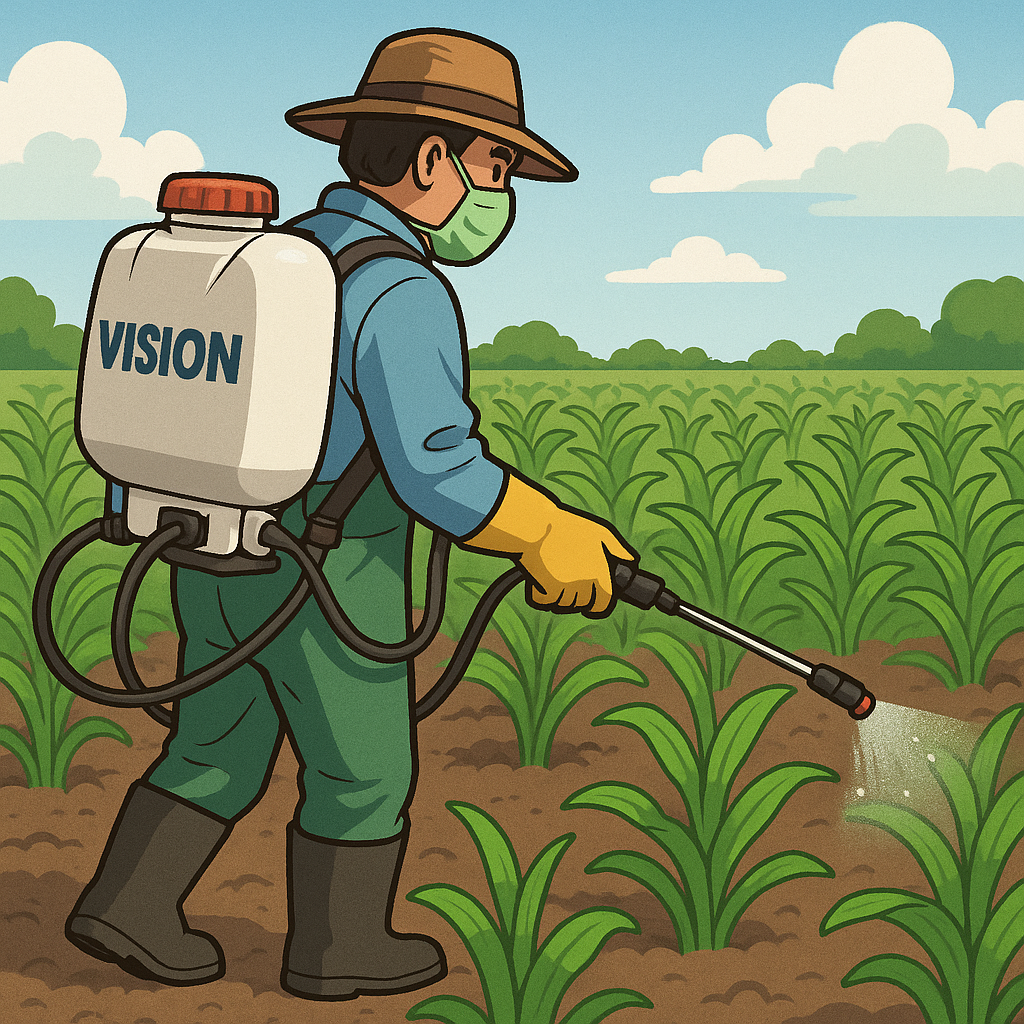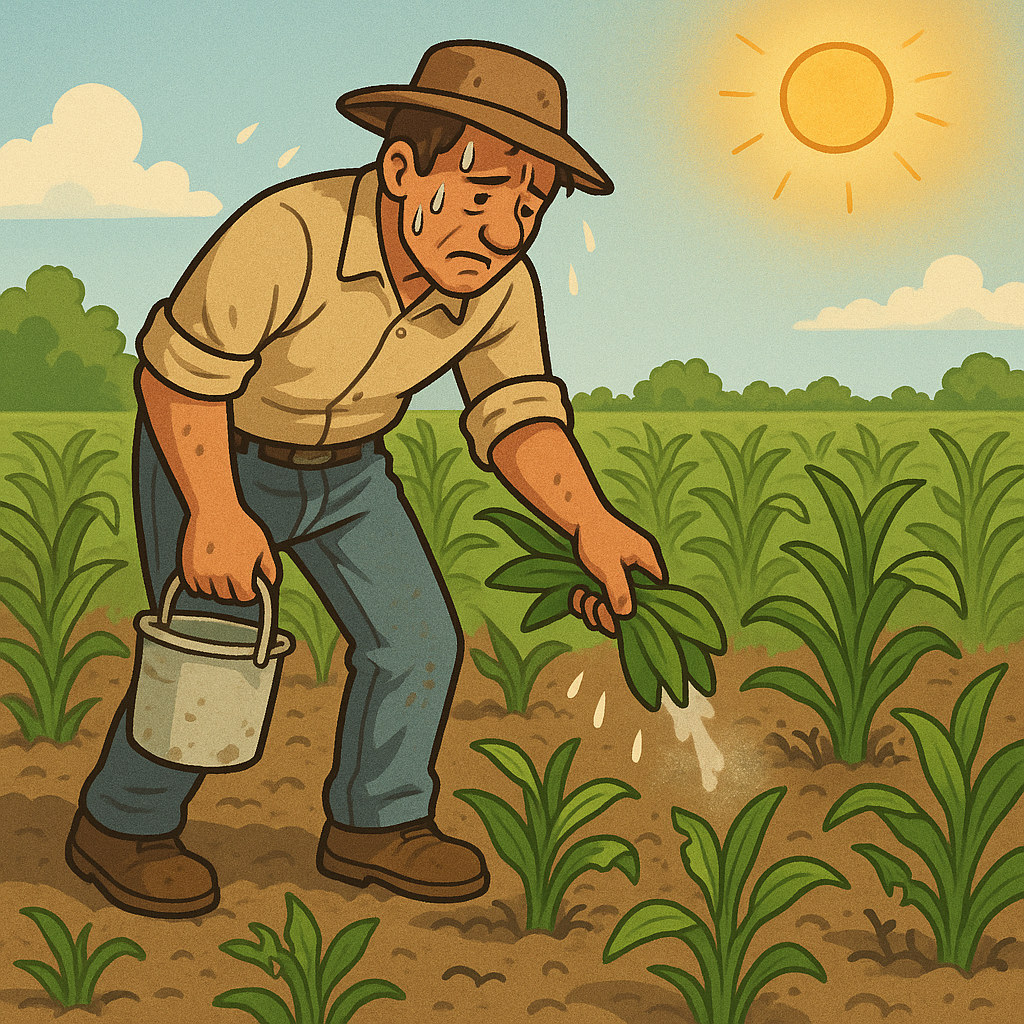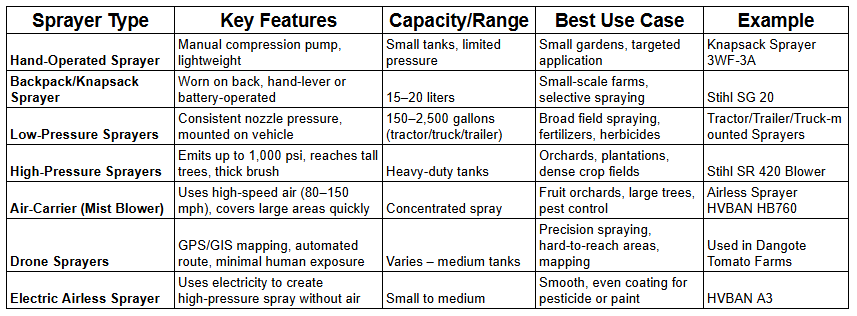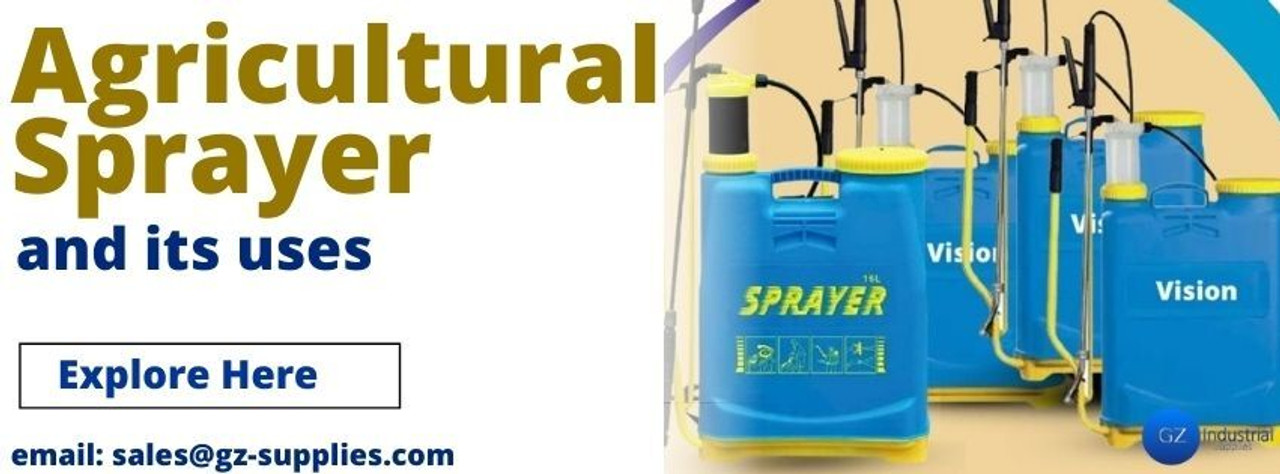Agricultural Sprayer and its uses
Introduction
Agricultural sprayers are a special type of farm equipment used for applying liquid substances such as fertilizers and pesticides to plants during the crop growth cycle. These remarkable farming tools come in various sizes and types, from hand-held and manual sprayers to large trailed or mounted sprayers followed by advanced atomizers.
Agricultural sprayer are essential agricultural tools which are commonly used by farmers. These machines are ideal for a variety of farming tasks during crop production cycle.
Stay with us as we highlight more information on Agricultural sprayers.

Under the clear morning sky, Adamu strides confidently through his thriving maize field, carrying the lightweight Vision Backpack Insecticide Sprayer on his back. Unlike the exhausting methods he used in the past, this sprayer’s ergonomic design and balanced weight distribution make it easy for him to cover large sections of the field without strain. With its fine mist nozzle and precise wand control, Adamu ensures every crop receives even protection, saving time and reducing chemical waste. For small to mid-sized farm owners like Adamu, switching to the Vision sprayer means less fatigue, higher productivity, and healthier crops. It’s not just a tool—it’s a smarter way to farm.
Read more...Top Industrial Paint Sprayers in Nigeria for Fabrication Experts
Agriculture Insecticide Sprayer Machine Vision
Key Takeaway
- Agricultural sprayers are essential tools used to apply fertilizers, herbicides, pesticides, and other agrochemicals efficiently and uniformly across crops.
- They help in protecting crops from pests and diseases, improving yield, and promoting healthy plant growth.
- Sprayers come in various types including handheld, backpack, knapsack, boom, and drone sprayers, each suited to different farm sizes and application needs.
- Proper calibration and maintenance of sprayers ensure accurate chemical application, reducing waste and environmental harm.
What are Agricultural sprayers?
A sprayer is a device used to spray a liquid, where sprayers are commonly used for projection of water, weed killers, crop performance materials, pest maintenance chemicals, as well as manufacturing and production line ingredients. In agriculture, a sprayer is a piece of equipment that is used to apply herbicides, pesticides, and fertilizers on agricultural crops. Sprayers range in size from man-portable units (typically backpacks with spray guns) to trailed sprayers that are connected to a tractor, to self-propelled units similar to tractors with boom mounts of 4–30 feet (1.2–9.1 m) up to 60–151 feet (18–46 m) in length depending on engineering design for tractor and land size.
Agricultural sprayers have been engineered to optimize their applicability and performance for the many purposes that the machines are put to, whether being used on crops, vegetation, or soil. Agriculture sprayers are often used for applying water and water/chemical solutions containing acids or caustic materials for crop-performance or pest-control; i.e. fertilizers and pesticides.

Under the harsh midday sun, Adamu toils through his maize field, bent over with a makeshift leaf bundle in one hand and a small tin of insecticide in the other. With sweat dripping down his face and uneven crops stretching endlessly ahead, every step feels heavier than the last. This manual method not only leads to inconsistent spraying but also leaves Adamu exhausted and in pain, especially in his lower back. Over time, the repetitive bending and awkward postures have taken a toll on his body. According to a PubMed study on occupational back pain in farming, poor ergonomic practices like these are a major cause of chronic musculoskeletal disorders among farmers. For Adamu, the frustration of slow progress and the physical strain make each day harder than the last—a challenge that could be solved with the right equipment.
Read more...Best Paint Sprayers for Structural Steel Fabrication in Nigeria
Types of Agricultural Sprayer
There are many types of sprayers that are used in the farming or agricultural industry.
Low-Pressure Agricultural Sprayers
A low-pressure sprayer is used to provide constant nozzle pressure. These sprayers come in different types, namely, tractor-mounted, trailer-mounted, and truck-mounted. Depending on the vehicle you have and the size of the area you need to spray, you need to select a low-pressure sprayer that can fit enough gallons to finish the job.
The Truck-mounted sprayer can fit up to 2,500 gallons in its tank and can boom up to 60 feet, making it the best option for vast applications. While the Trailer-mounted sprayer. for medium applications, a trailer-mounted sprayer should do the job. The tank of a trailer-mounted sprayer can have a capacity of 1000 gallons, with a boom reaching 12 to 50 feet. Tractor-mounted sprayer, and the tractor-mounted sprayer is the smallest type of low-pressure sprayer, with a capacity of 150 to 500 gallons only.
Agriculture Insecticide Sprayer Machine Firman
High-Pressure Agricultural Sprayers
High-pressure sprayers are designed to reach tall trees and thick brush. Compared to low-pressure sprayers, this type of sprayer is heavier and more expensive. However, it can emit pressures of up to 1,000 psi.
Stihl Petrol Power Backpack chemical Sprayer and Blower SR 420
Air-Carrier Sprayers
Also known as air-blast sprayers or mist blowers, air-carrier sprayers use high-speed air to deliver pesticides at speeds of 80 to 150 miles. Because the air disperses the pesticide while spraying, the pesticide used in air-carrier sprayers is concentrated. Hence, there is less time needed for diluting and re-filling the tank.
Hand-Operated Agricultural Sprayers
This is a simple machine with an air pump inside to release pressurized air from the nozzle. A hand-operated agricultural sprayer is a manual hand-compression sprayer that consists of a tank for holding a liquid insecticide formulation, which can be pressurized by means of a hand pump attached. The compressed air forces the liquid from the tank via a hose with a cut-off valve, a lance and a nozzle.
A hand-operated sprayer is not meant for wide distribution because when the pressure drops too low, you must wait for it to go back up until you can spray again. Nevertheless, it is the cheapest type of sprayer for agricultural purposes.
Electric Airless Sprayer A3 HVBAN
Comparison Table: Agricultural Sprayers – Types, Features & Applications

Common Uses of Agricultural Sprayer
Mapping
The new drone sprayers are equipped with software that follows a specific path for mapping. They are equipped with cameras and sensors onboard that take pictures automatically. Other drones are equipped with GPS to measure farm sizes and to monitor areas that need spraying attention. In addition, they are capable of carrying more pesticides and fertilizers without tampering with crops as compared to tractors. It also helps in reducing pesticide exposure to humans that would have sprayed manually.
Liquid fertilizer application
Liquid fertilizer application is the appropriate use in dryland. This sprayer is parked with liquid fertilizer to make this method efficient. It is the perfect choice because of its ability to target a specific crop without losing a lot of liquid to the winds or evaporation. Furthermore, this type of spraying is very beneficial for crop growth and early rooting. Although the main purpose is to supply crops with nutrients.
Spraying water
A water sprayer is a device used to spray water on plants and animals. Apart from spraying pesticides and fungicides, sprayers can be used to hydrate plants and animals. There are high-pressure sprayers that are used over small areas for irrigation. Additionally, before crops are harvested they are sprayed with fresh water to clean any chemical deposits that could have been left behind. During hot weather, sprayers are used to cool livestock and insects that are kept for agricultural purposes.
Spraying fungicides
Fungi, blight, and rusts are controlled by the use of a hand sprayer. They are the plant’s worst enemy because they lower crop production. Parasitic fungi affect the animals as well. But with the help of a hand sprayer, a farmer is able to control them. Most fungicides are sold in liquid form and contain 90% Sulphur. Sprayers are very effective when it comes to controlling the fungi since most of them affect the leaves.
Pest control
Agricultural pest sprayer is one of the most efficient gadgets that is used for controlling pests. Pesticides are mixed with water and then sprayed to areas infested. In areas that are highly infested, spraying is done every two weeks. It is also sprayed on the livestock to kill ticks and other dangerous pests that lower production. Houses are also sprayed to get rid of mosquitoes, cockroaches, ants, bed bugs, reptiles and so on.
Spraying herbicides
Unwanted vegetation is controlled by the help of sprayers. To achieve this, the herbicide is mixed with water inside a sprayer. The farmer then sprays over the unwanted vegetation which dries up after a few days. In the past farmers were able to spray in a piece of land with unwanted vegetation only. However, scientists introduced new chemicals that can select and eliminate unwanted crops in the same land. The selective herbicides are administered using a sprayer too.

Stihl Manual Backpack Sprayer SG 20
Importance of Agricultural Sprayer
- It is used for controlling pests. Pesticides are mixed with water and then sprayed to areas infested.
- It is also used for spraying livestock to kill ticks and other dangerous pests that lower production.
- It is used for applying liquid substances such as fertilizers and pesticides to plants during the crop growth cycle.
- It is used for applying water and water/chemical solutions containing acids or caustic materials for crop-performance.
Read more...How to Choose the Best Paint Sprayer for Professional and DIY Projects in Nigeria
Agricultural Sprayer Maintenance Tips
Maintenance is an essential requirement after the purchase of an equipment and GZ Industrial supplies have made available some important tips for a long lasting equipment enjoy!
First and foremost, you need to make sure your agricultural sprayer is in top condition before using and then maintain your sprayer throughout the growing season.
Sprayer maintenance includes checking fluid levels, greasing necessary components, calibrating the sprayer monitor, and more.
Before use
- Check all fluids, engine, and driveline.
- Grease boom.
- Torque lug nuts.
- Grease steering, axle, and driveline.
- Check axle extension bolt torque.
- Tighten poly tank straps.
- Adjust boom.
- Check lighting and flashers.
- Record all field computer calibration values.
Daily Maintenance after Use:
- Check and clean engine coolant level.
- Check transmission oil level.
- Check hydraulic fluid level.
- Check A/C belt and/or serpentine belt tension.
- Grease boom: grease flag pins, sway pivots, tip hinge, and boom fold pivots every eight hours of run time.
- Check engine air intake system: make sure clamps are in place around the air filter and charge air tubes.
- Check lighting and flashers.
Chemical sprayer Knapsack Sprayer 3wf-3A
Case Studies: Successful Farmers Utilizing Sprayers
Optimizing Pesticide Use in an Orchard - John’s Apple Farm, Kaduna State, Nigeria
John runs a thriving apple orchard in Kaduna State and was struggling with pest infestations that significantly impacted yield. He adopted an airblast sprayer to apply pesticides uniformly across his orchard. The sprayer allowed him to target the canopies effectively, resulting in a 40% reduction in pest populations and a subsequent 25% increase in apple yield. Additionally, the precision application helped John reduce chemical use, saving costs and minimizing environmental impact.
Boosting Productivity with Drone Sprayers - Dangote Tomato Farms, Kano, Nigeria
Rahul, a rice farmer in Kano, faced challenges in covering his large fields using traditional spraying methods. He switched to drone sprayers, allowing precise and efficient pesticide application, especially during the monsoon season when manual application was not feasible. The drones reduced labor time by 60% and resulted in healthier crops due to more consistent coverage, which translated into a 30% increase in productivity.
Knapsack Sprayer for Small-Scale Farming - OK Vegetable Garden, Delta state, Nigeria
Vincent operates a small vegetable farm in Delta state and was struggling with pest management in her organic crops. He adopted a knapsack sprayer, which allowed him to selectively spray organic pesticides without affecting beneficial insects. This targeted approach improved crop health and ensured a higher quality harvest, ultimately allowing her to secure a premium price for her vegetables at the local farmer’s market.
Where to Buy Agricultural Sprayer in Nigeria?
GZ Industrial Supplies.
GZ Industrial Supplies has a plethora of quality chemical solvents, lubricants , power tools, Agricultural equipment and other industrial products. You can buy quality agricultural sprayer in any of our branches across Nigeria from the offices below:
GZ Industrial Supplies Ikeja
18 Adesina Street, Off Obafemi Awolowo Way,
Ikeja, Lagos. Tel. +234 8181069339, +234 7031515985, +234 8060907072
WhatsApp: +234 8181069339
GZ Industrial Supplies Lekki
Suite 10, Olive Plaza by Osapa London Bus Stop,
Lekki, Lagos.Tel. +234 8181069339, +234 8053390169 +234 8060907072
GZ Industrial Supplies Apapa
10 Apapa Oshodi Expressway, Coconut Bus stop Opposite Total Jetty,
Apapa,Lagos,Tel. +234 8181069339, +234 7031515985, +234 8060907072
GZ Industrial Supplies Port Harcourt
238 Aba Road, Onyejieke’s Plaza beside Fidelity Bank, Rumuogba, Port Harcourt.
Tel. +234 8181069339, +234 8053390169 +234 8060907072
GZ Industrial Supplies Calabar
30/32 Ndidem Usang Iso Road,
Marian, Calabar. Tel. +234 8181069339, +234 8053390169 +234 8060907072
GZ Industrial Supplies Ogba
79 Yaya Abatan, by College Road Ogba, Lagos
Tel. +234 8181069339, +234 8053390169 +234 8060907072
Frequently Asked Questions
1. How do manual agricultural sprayer work?
You pump the trigger up and down, forcing air (initially) from the nozzle. The air inside the top of the bottle is at higher pressure than the air in the tube, so it pushes down on the liquid. The liquid is forced up the tube toward the pump mechanism. The liquid leaves as a fine mist of aerosol spray.
2.What is a crop sprayer used for?
In agriculture, a crop sprayer is a piece of equipment that uses spray nozzles to apply controlled doses of herbicides, pesticides, and fertilizers to agricultural crops.
3. Why do farmers use sprayers?
While sprayers were once a niche product, today sprayers have become an essential piece of farm equipment for effective crop production. By properly applying chemicals to control weeds, insects, and diseases, you give your crop the best chance for high yields.
4. What kinds of chemicals are used in agriculture?
The different types of chemicals used in agriculture are:
- Herbicides (To kill weeds)
- Insecticides: (To kill bugs)
- Fungicides: (To get rid of disease)
- Soil fumigants, desiccants, harvest aids, and plant growth regulators.
- Natural pesticides: Pesticides are not limited to conventional agriculture
Related Articles
What are Agricultural Machinery
Where to Buy Agricultural Sprayer in Nigeria?
Types of Agricultural Machinery and Their Uses
Conclusion
This sprayer is an essential agricultural tool which is commonly used by farmers for effective crop production. These machines are ideal for a variety of farming tasks during crop production cycle. Farm sprayers are agricultural sprayers used to help maintain land or address problems associated with farmland. Agricultural sprayer is one of the tools that is a must for all farmers.
Contact us for further details and availability of safety equipment with the storefront in your location.












